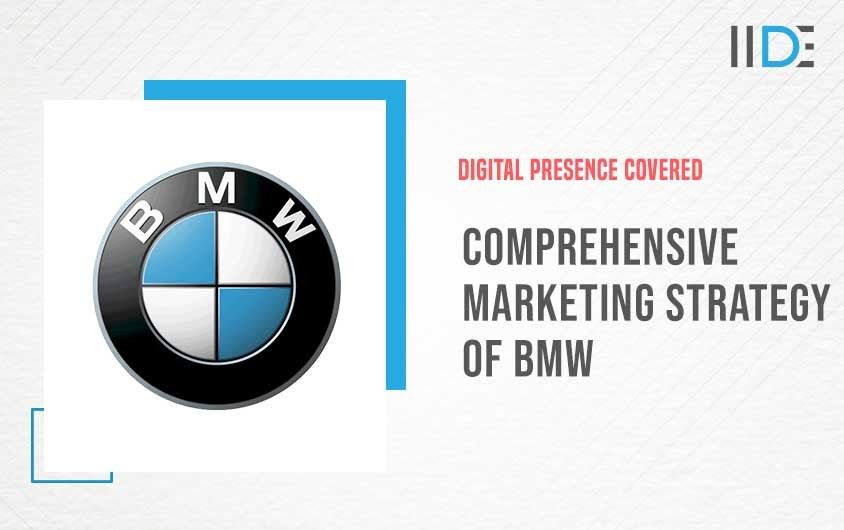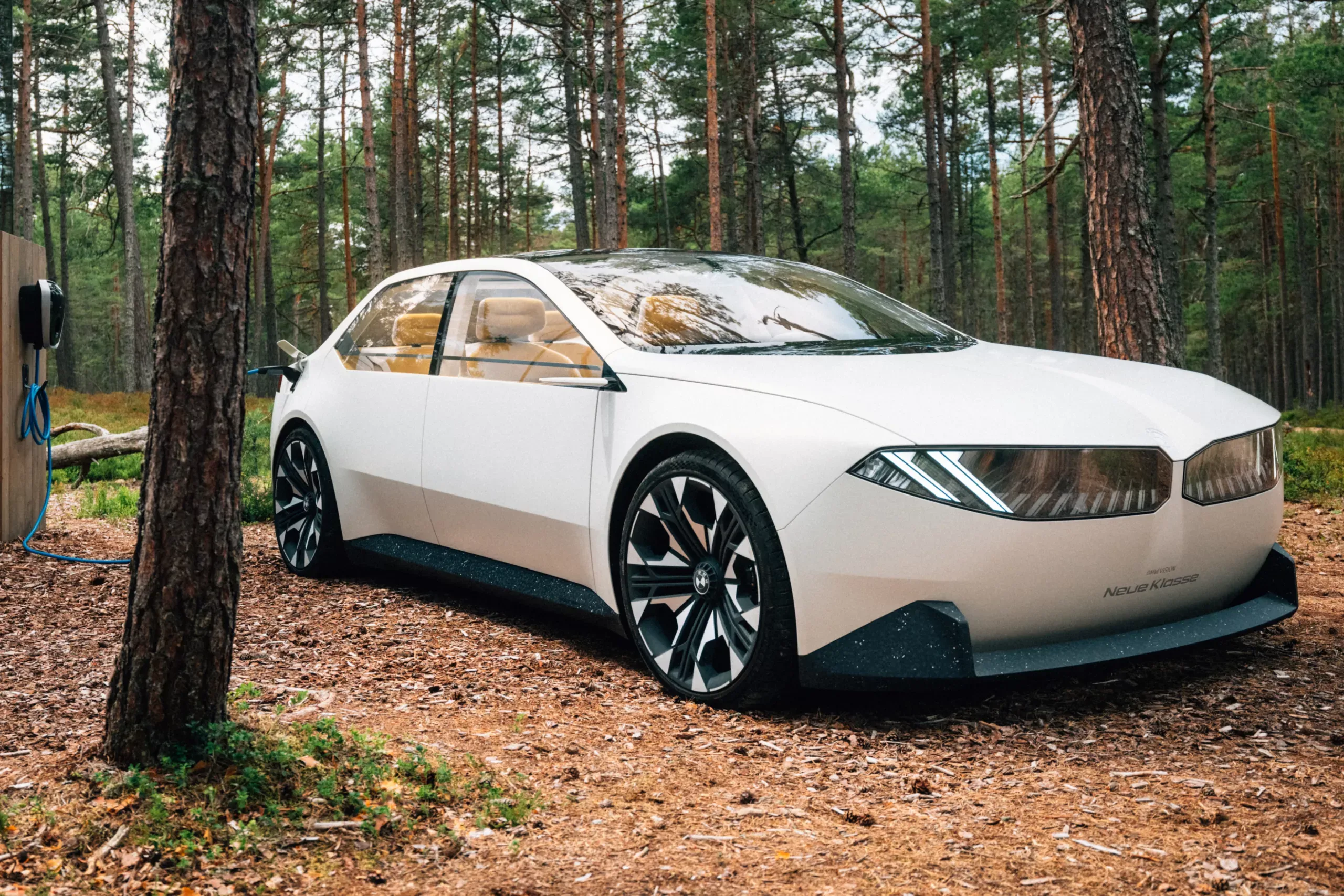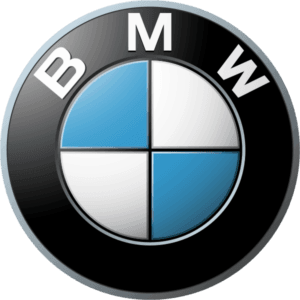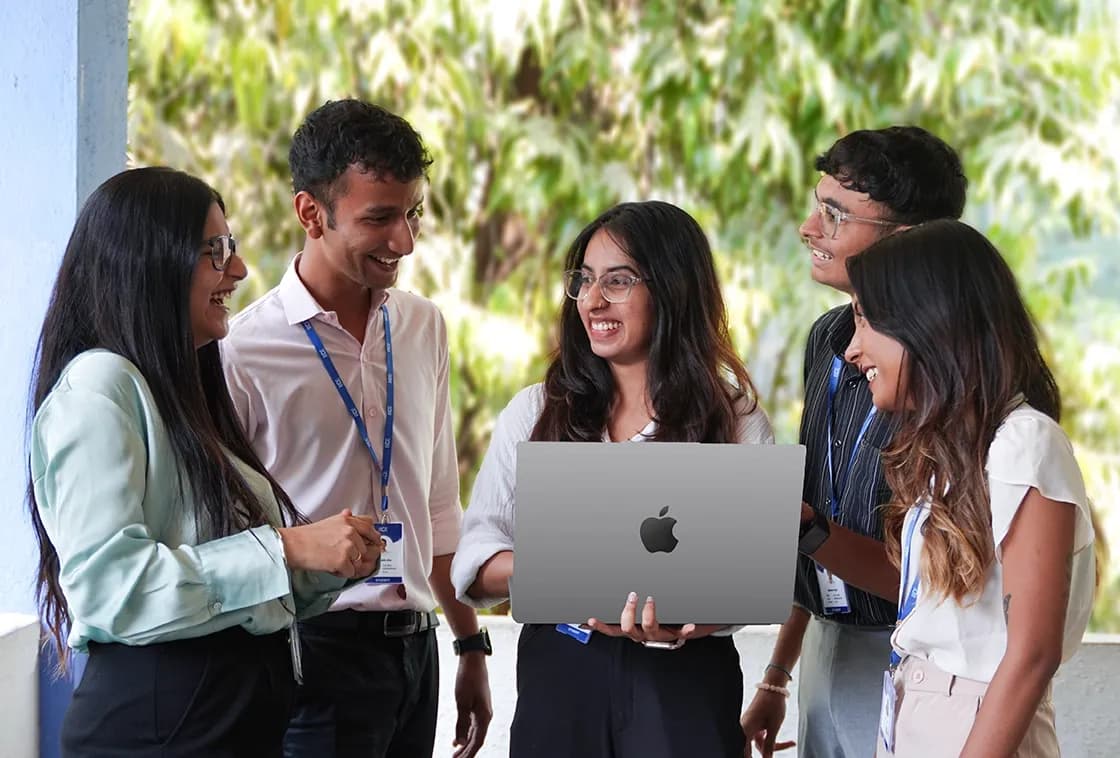
Updated on Dec 12, 2025
Share on:
BMW's 2026 marketing strategy relies heavily on digital channels, including SEO, AI-based personalisation, and influencer-led campaigns. Their EV-focused storytelling, Neue Klasse launch, and advanced dealer training set the brand apart.
With over 2.1M monthly organic visitors and a 65% increase in paid search, BMW educates consumers while reinforcing its premium EV leadership.

About BMW

Founded in 1916, BMW (Bayerische Motoren Werke AG) is a German multinational company that produces luxury vehicles and motorcycles. Positioned as "The Ultimate Driving Machine," BMW is known for engineering excellence, premium aesthetics, and performance. The brand operates globally, serving over 100 countries and employing more than 120,000 professionals.
In recent years, BMW has rapidly embraced electrification and sustainability, becoming a top-tier EV contender. With flagship electric vehicles like the BMW iX and the 2025 launch of the Neue Klasse platform, BMW is aligning heritage with futuristic innovation.
BMW generated approximately €155.5 billion in revenue in 2024 and continues expanding its digital footprint. In India, it has grown substantially, with the X1, X5, and electric iX1 contributing to high YoY growth. Major competitors include Audi, Mercedes-Benz, and Tesla.
BMW's core marketing goals include EV awareness, digital-first customer journeys, and strengthening its leadership in the premium mobility sector.


Learn Digital Marketing for FREE


Marketing Objective or Business Challenge
BMW faced the dual challenge of increasing EV adoption while preserving its premium brand equity. With EV competition heating up and consumers seeking more sustainable options, BMW needed to differentiate its offering beyond specs and price.
Its key goals in 2026 include:
- Increasing EV share to 25% of total vehicle sales
- Enhancing digital visibility via SEO and content
- Expanding personalised outreach to premium tech-savvy buyers
The brand struggled with dealer EV readiness and fragmented digital engagement across global regions. Bounce rates remained high across legacy platforms and EV-specific queries lacked deep content hubs. BMW had to rewire its approach with a digitally-integrated, customer-education-first strategy to lead the premium EV space.
Marketing Channels Used by BMW
Main Channel for Marketing: Digital Marketing is BMW’s primary strategy in 2026, emphasising personalisation and premium storytelling.
Subparts:
- SEO: Optimised landing pages and EV guides; 348.2K ranked keywords
- SEM: Paid campaigns with a 65% increase in traffic; 19.2K paid visits
- Social Media: Instagram and YouTube for product storytelling; influencer campaigns
- Content Marketing: Blogs, short-form videos, AI-driven articles
- Email Campaigns: Dynamic content flows based on browsing and model interest
Brand-Specific Adjustments:
BMW invested in EV education hubs and AI-backed dealer tools to unify digital and offline journeys, focusing especially on the Neue Klasse audience.
Additional Insights:
Emerging channels include influencer test-drive vlogs, BMW-branded mini-documentaries, and AR-based product visualizers.
BMW Marketing Strategy Breakdown
Digital Marketing:
- Strong SEO with 2.1M monthly visits and 2.87M backlinks; SEM push increased paid traffic by 65%. Email campaigns use behavioural automation.
Content Strategy:
- Neue Klasse launch blogs, behind-the-scenes videos, design reveals, and how-to guides.
- Influencer video series built anticipation pre-launch.
Influencer & Brand Partnerships:
- Collaborated with Gigi Hadid, tech influencers, and top auto vloggers across Instagram and TikTok.
- Co-branded campaigns with sustainability-focused tech brands.
Social Media Marketing:
- Dynamic video-led engagement on Instagram and YouTube. Stories > Posts by 2.4x engagement.
App Marketing & Push:
- My BMW app sends EV tips, charge alerts, and scheduling messages.
- Push open rate: 34%.
Media Mix:
- 40% organic, 60% paid.
- Organic drives long-term loyalty; paid brings spikes during launch phases.
Messaging & Tone:
- Premium, futuristic, authoritative.
- Unified across social, email, and site.
Channel Choices:
- Instagram for reach, YouTube for long-form education, LinkedIn for investor content.
Data & Campaigns:
- Neue Klasse launch (Feb 2025), 3.2M impressions, #BMWNeueKlasse trended 2 days.
Marketing strategy of Rolls-Royce highlights how ultra-luxury positioning and personalised craftsmanship elevate brand prestige.
Results & Impact
1. Website Traffic Growth:
BMW.com recorded 2.1M monthly organic visits, driven by strong SEO, supported by 2.8M backlinks and 37.8K referring domains.
2. Paid Traffic Surge:
BMW saw a 65% YoY rise in paid traffic, reaching 19.2K visitors monthly, reflecting improved ad targeting and higher conversion intent.
3. SEO Performance:
The site ranks for 348.2K keywords, helping it maintain an Authority Score of 68, positioning BMW as a dominant auto brand online.
4. User Engagement:
Visitors spend 7:45 minutes per session, view 4.54 pages, and show a bounce rate of 44.55%, proving strong user retention and effective content strategy.
5. U.S. Market Penetration:
BMW commands a 3% share of U.S. web traffic in its category, indicating high brand visibility and local market strength.
6. Neue Klasse Campaign Results:
Generated 3.2M impressions and an 18% boost in EV landing page traffic, showing clear campaign ROI.
7. Influencer & Dealer Impact:
YouTube influencer videos drew 1.1M views with a 12.5% CTR. Internally, 95% of dealers are now EV-ready due to AI-powered training programs.
Honda marketing strategy demonstrates how a balance of performance and affordability appeals to a wide automotive audience.
What Worked & Why
BMW’s marketing success lies in integrating digital personalisation with EV education.
SEO-rich content and YouTube videos addressed EV concerns, driving traffic and engagement.
Influencer partnerships humanised BMW's cutting-edge tech. The My BMW app created a seamless ownership experience with smart push notifications.
Neue Klasse’s futuristic design story captivated a younger, affluent audience.
Strategically, the shift from traditional ads to mobile-first storytelling aligned with audience habits.
The AI-powered dealer network ensured consistent brand delivery globally.
This balance of heritage, tech, and personalised media drove ROI and brand loyalty.
What Didn’t Work & Why
While most campaigns succeeded, BMW’s earlier EV marketing suffered from generalised messaging.
Pre-2023 campaigns lacked specificity around real-life charging infrastructure and cost-of-ownership comparisons.
This limited appeal among sceptical new buyers.
Additionally, early email campaigns had open rates below 10% due to generic subject lines and non-personalised offers.
Some influencer campaigns in Asia underperformed due to misaligned audience-product fit.
Lessons learned: geo-specific targeting and localised storytelling perform better than one-size-fits-all global strategies.
BMW adjusted by integrating AI-led CRM flows and recruiting region-specific creators.
SWOT analysis of BMW offers a strategic view of how innovation and brand equity sustain its leadership in the premium auto market.
IIDE Student Recommendations: Key Areas for Brand Improvement
As a global business consultant with six decades of experience, I’ve observed how market leaders sustain momentum through precision, localisation, and experience innovation. BMW’s strong foundation can be scaled further through focused execution on digital and behavioural insights.
These seven actionable, real-world recommendations are grounded in strategic models, technological feasibility, and proven luxury market dynamics.
1. Develop Localised EV Experience Platforms
Tactic: Launch market-specific digital hubs featuring range estimators, local subsidies, charging maps, and maintenance comparisons.
Why: This ensures trust and increases conversions among hesitant buyers by contextualising the EV experience.
2. Activate Micro-Influencers in Niche Markets
Tactic: Engage influencers in Tier-2 cities, sustainability verticals, and EV community channels.
Why: Builds authentic community influence and expands reach in under-leveraged buyer segments.
3. Deploy Predictive CRM Journeys
Tactic: Integrate AI into the My BMW App and email flow to personalise communication by model interest, lifecycle, and service history.
Why: Reduces churn and maximises customer lifetime value.
4. Launch a Premium Loyalty & Referral Program
Tactic: Offer owners tiered rewards, early access to events, test drives, and upgrades, for referrals or milestone completions.
Why: Creates emotional buy-in and sustains advocacy organically.
5. Integrate AR/VR in Virtual Configurators
Tactic: Allow customers to virtually test-drive, sit inside, and simulate real-world scenarios.
Why: Enhances confidence and drives showroom traffic through immersive digital-first discovery.
6. Co-host Eco Mobility Showcases with Clean Tech Partners
Tactic: Collaborate with renewable energy providers and smart city councils to host BMW-led EV experience zones.
Why: Establishes BMW as a societal contributor to clean mobility.
7. Expand into Short-Form EV Education Series
Tactic: Produce weekly YouTube Shorts and TikTok videos answering real EV buyer FAQs.
Why: Educates and entertains Gen Z and Millennial buyers where they already spend time.
Want to Know Why 5,00,000+ Students Trust Us?
Dive into the numbers that make us the #1 choice for career success

MBA - Level
Best For
Fresh Graduates
Mode of Learning
On Campus (Mumbai & Delhi)
Starts from
Mar 2, 2026
Duration
11 Months
Live & Online
Best For
Working Professionals
Mode of Learning
Online
Starts from
Feb 20, 2026
Duration
4-6 Months

Online
Best For
AI Enthusiasts
Mode of Learning
Online
Duration
5 Months

Offline
Best For
12th Passouts
Mode of Learning
On Campus (Mumbai)
Duration
3 Years
Recent Post
Aditya Shastri leads the Business Development segment at IIDE and is a seasoned Content Marketing expert. With over a decade of experience, Aditya has trained more than 20,000 students and professionals in digital marketing, collaborating with prestigious institutions and corporations such as Jet Airways, Godrej Professionals, Pfizer, Mahindra Group, Publicis Worldwide, and many others. His ability to simplify complex marketing concepts, combined with his engaging teaching style, has earned him widespread admiration from students and professionals alike.
Aditya has spearheaded IIDE’s B2B growth, forging partnerships with over 40 higher education institutions across India to upskill students in digital marketing and business skills. As a visiting faculty member at top institutions like IIT Bhilai, Mithibai College, Amity University, and SRCC, he continues to influence the next generation of marketers.
Apart from his marketing expertise, Aditya is also a spiritual speaker, often traveling internationally to share insights on spirituality. His unique blend of digital marketing proficiency and spiritual wisdom makes him a highly respected figure in both fields.